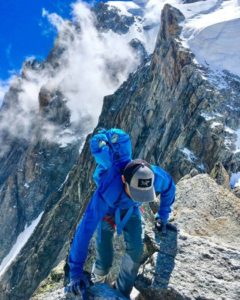‘I focused on what I was able to do,’ says Adam Campbell, featured in new film

Adam Campbell was once an elite-level ultramarathoner who could dash over a dozen mountain peaks in a day.
Reaching the podium in races was almost a given, no matter the length and difficulty of the race.
Once he got thrown by lightning during a race but still managed to come third.
But on Aug. 30, 2016, Campbell nearly died.
He was running across Rogers Pass, B.C., doing the Horseshoe Traverse, a course of 14 mountain peaks. Normally it takes three to five days. Campbell and his friends were trying to do it in a single day.
At least 300 feet up the side of the mountain, he grabbed a rock and it pulled out.
“I still get flashbacks of falling down the mountain,” said Campbell, who lives in Canmore, Alta.
He broke several vertebrae as well as his iliac crest at the top of his hip, ripped his ankle from the top of his foot and received extensive lacerations across his body.
“I was conscious through the entire accident, too, which was pretty horrendous,” he said. “Luckily I was wearing a helmet, which saved my life, for sure, and yeah, the pain was horrific.”
A new film, directed by Cameron Sylvester, documents Campbell’s journey to healing, both from his physical injuries to accepting he is no longer the elite athlete he once was.
The documentary, In Constant Motion, won best mountain sports film at the 2018 Vancouver International Mountain Film Festival and is now available for viewing online.
Only 10 months after his accident, Campbell was back running, attempting the Hardrock Hundred Mile Endurance Run in Colorado — the competition in which he once placed third after a lightning strike. That’s when he realized he’d face a bigger challenge than learning to run again.
“When the gun went off, despite telling myself I was just there to enjoy the experience, I went off with the leaders. After about two hours, the leaders started to run away from me,” Campbell told the Calgary Eyeopener.
“That was really, really difficult for me. It literally was my former physical self running away from me.”
Campbell says he recognizes what an unusual case he is. He suffered a traumatic injury and recovered enough to come 31st out of about 150 athletes competing in the elite Hardrock race.
“I realize that was quite a privileged position,” he said.
“My body wasn’t able to do what it was able to do previously. But instead, in this case, I didn’t let myself dwell on what my limitations were. Rather, I focused on what I was able to do.”
He always defined himself by his ability to compete physically, and against other people. Now he’s trying to challenge himself by pushing his personal limits, and finding ways to live without the same level of movement he once thrived on.
“As I was falling and laying at the base of this mountain, in this pile of scree, basically, bloodied and broken, at that moment, not moving was actually the most important thing to me,” Campbell said.
“That was probably the first really cathartic moment for me, was realizing that not moving was critical to my life.
“And then for a long time, movement just wasn’t comfortable. It was really painful for me, and I really struggle with that because at the time in my life when I needed an outlet the most, I’d lost it.”
Campbell says he’s surrounded by nature while at home in Canmore, commuting to work in Calgary for his job as a lawyer.
He’s learned to sit silently to enjoy nature, even starting to sketch. It’s quite the change for someone whose mantra used to be, “if you’re not moving, you’re dead.” Hence the title of the film, In Constant Motion.

That adjustment, he says, is perhaps why his story has resonated with others.
“Everyone’s dealt with some adversity in their life at some point and has faced some sort of a challenge,” Campbell said.
“And your attitude as to how you approach that challenge can really have a big impact on the lessons learned from it and how it impacts your overall life.”


